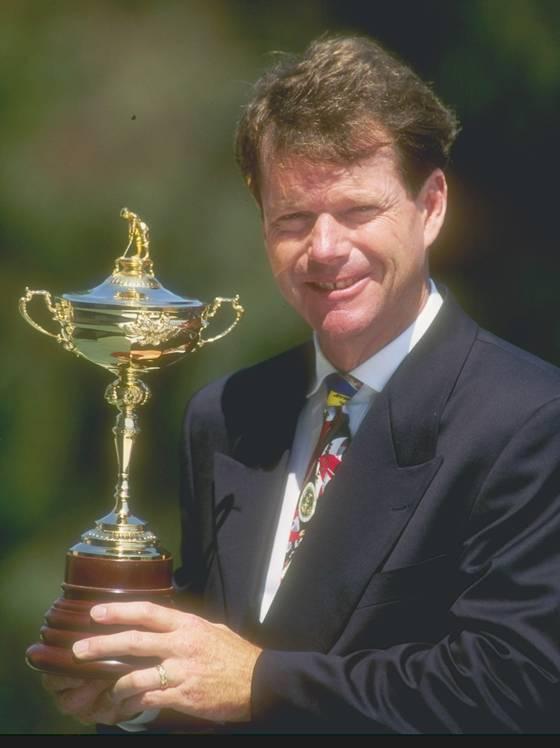
Tom Watson holds the Ryder Cup in 1993, the last time the USA won in Europe.(Photo: Gary Newkirk, Getty Images)
Story Highlights
- In selecting Tom Watson, the PGA of America breaks with its recent traditions
- Recent captains have been younger, and mostly still playing on the PGA Tour
- Azinger: “Tom knows how to win, how to get ready to win, how to lead a team to a win”
10:36AM EST December 13. 2012 – He’s beloved in Scotland.
Respected and admired the world over.
A proven winner with 39 PGA Tour titles, eight major championships and not a single “L” in five Ryder Cups he’s been a part of.
An old-school guy who has been through adversity on and off the golf course and come back the better for it.
And he loves facing down the harshest of elements.
That’s the Cliff Notes’ version of Tom Watson’s résumé — and just some of the reasons the PGA of America made the right choice in naming him the Ryder Cup captain for the 2014 matches in Gleneagles, Scotland.
BOLD MOVE: Watson picked as 2014 captain[1]
In tossing aside its 20 years of prototypical choices for captain — a player in his 40s who had at least one major championship and was still playing on the PGA Tour, thus staying in contact with potential players — the PGA of America turned back the clock to 1993 and found its man.
REACTION: Players excited about the pick[2]
Watson, whose teams went 3-0-1 when he played in four Ryder Cups, led the USA to victory in 1993 at the Belfry in England, the last time the red, white and blue celebrated on foreign soil. In the years since, has Watson forgotten how to lead, how to prepare a team, how to school a shaken player having trouble dealing with Ryder Cup pressure in a hostile environment? Not likely.
Or deal with pressure? As Watson said Thursday on NBC’s Today, he’s “loved that type of pressure and lived underneath it his whole career.” And the pressure will be at its apex come 2014. The USA doesn’t take kindly to losing, and in seven of the last nine matches against Europe in this biennial match-play tussle, the Stars & Stripes have limped home losers. That includes consecutive 19½-8½ blowouts in 2004 and 2006 and this year’s Miracle — or Meltdown — at Medinah when Europe stormed back from 10-6 deficit on the final day to win by one point. It matched the largest final-day comeback in Ryder Cup history.
“He will preach the gospel of preparation,” said Paul Azinger, the last victorious U.S. captain, in 2008. That year, Azinger called upon elder statesmen Dave Stockton and Raymond Floyd to be his assistants. “I saw tremendous value in having Raymond and Dave’s old school, no nonsense way of thinking. I believe Tom will bring that same intangible.
” … Tom knows how to win, how to get ready to win, how to lead a team to a win. … This was the right choice, the right time to pick Tom because the next Ryder Cup is going to be so difficult for America to win. But Tom will have that team prepared.”
Love, admiration and respect for Watson should mute much of the rancor expected to populate the galleries at Gleneagles, what with four of Watson’s five British Open titles coming in Scotland. His love for playing in all types of weather — be it sideways rain, 40 mph winds and biting cold — won’t be a detriment if Mother Nature is having a bad day during the Sept. 28-30 matches in a land that averages more than 40 inches of rainfall and temperatures around 45 that time of year.
“He had a smile on his face as he played,” Rickie Fowler said as he recalled seeing Watson on a miserable day in the 2011 British Open at Royal St. George’s. “I love his attitude on the course and it will carry over to the team.”
So what if he’ll be 65 when the matches begin? So what if he doesn’t play full- or part-time on the PGA Tour anymore? Disconnect from today’s new breed of player? No need to worry. Watson will pop in from time to time — the Masters and British Open to count just two — and will have his golf radar locked in on the PGA Tour’s Americans.
“Tom Watson makes perfect sense to me,” Steve Stricker said. ” … He has the respect and admiration of the players. I don’t think it’s a prerequisite to have to be out on the PGA Tour playing on a continual basis to keep in contact with the players. He’ll know who is playing well, and his reputation and resume has to be respected and admired.
“It’s a great choice.”